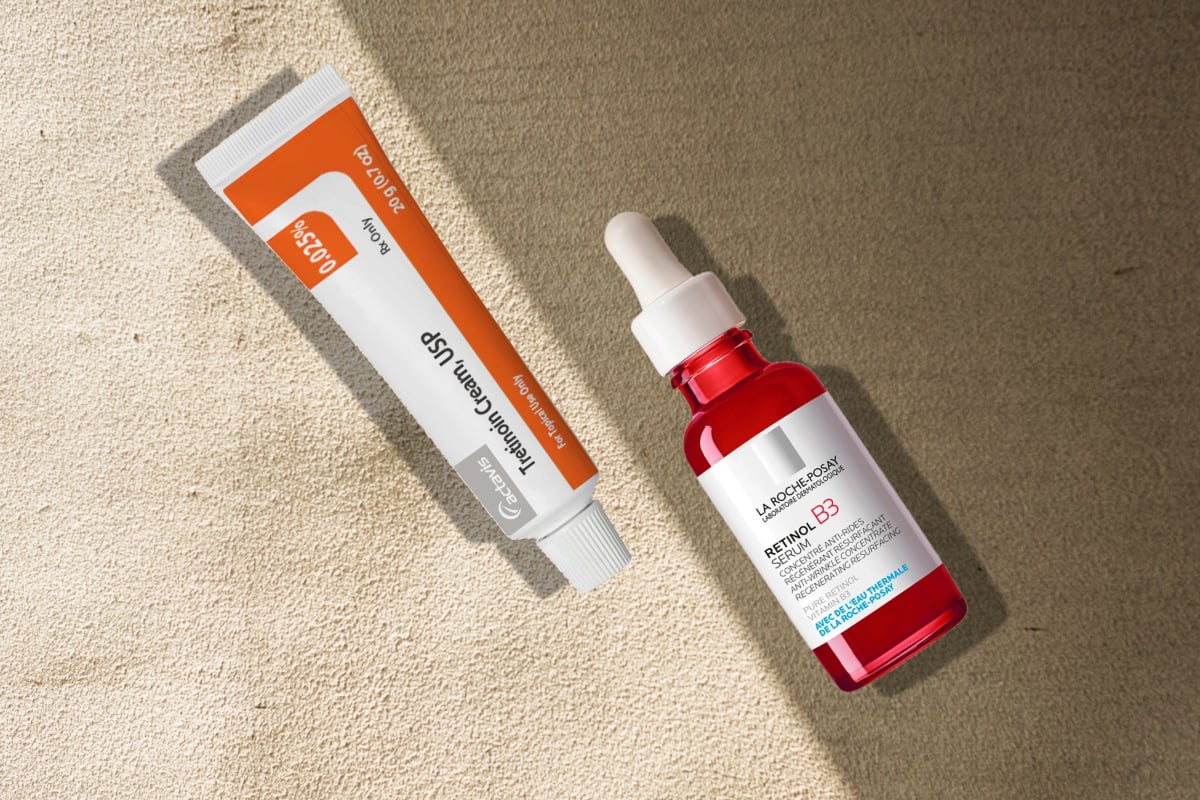Coenzyme Q10 is a natural antioxidant made by the body that’s often added to beauty products for its protective and regenerative effects. What I like the most about it—the reason I made it a part of my skincare routine and encourage you to do it as well—is that it has all things that I need and none that I don’t. It does the heavy lifting when it comes to scavenging free radicals, adds a bit of radiance and hydration to my skin, promotes elasticity and firmness, and is as gentle as it can be. In a nutshell: coenzyme Q10 is that ingredient that any type of skin would love to drink up, and it’s a must if you live in a polluted city or get often exposed to the sun. Read on to learn the science behind it and all the reasons to make coenzyme Q10 the front of your vanity countertop.
What is coenzyme Q10?
Coenzyme Q10, or ubiquinone, is a fat-soluble compound present in almost every cell of our body. It has two main functions: to support the body’s antioxidant defense system and produce energy within cells. In the grand scheme of things, this means coenzyme Q10 is a vital component in promoting cellular regeneration, restoring skin, and protecting from oxidative damage caused by free radicals.[1]
However, with age, the natural level of CoQ10 decreases. Because of this, the skin becomes less able to repair itself and fight external damage from UV and pollution, which also means it will be more susceptible to premature aging signs, such as fine lines and wrinkles.
As someone who’s been well aware of the importance of antioxidants, my humble recommendation is to focus on replenishing CoQ10 levels once you hit your 40s with skincare products. It would also help to add CoQ10-rich foods into your diet to ensure your skin ages healthily.
How coenzyme Q10 can improve your skin
Anti-aging, protective, and restorative benefits are what put coenzyme Q10 on top of my favorite skincare actives. It has both preventive and corrective effects that go a long way in preserving skin integrity.
- Provides antioxidant protection: Coenzyme Q10 is a potent antioxidant and free radical scavenger made by the body that helps protect the skin from damage caused by environmental factors such as UV radiation, pollution, and smoke.[2] It provides maximum photoprotection when used before exposure to these external factors—like applying it in the morning—and when used in conjunction with other antioxidants (think vitamins C and E).
- Energizes cells: CoQ10 plays a crucial role in the production of ATP, the energy currency of cells. Once applied to the skin, it acts as a messenger that sends signals to cells to repair, nourish and energize them. Trust me, everything is better about your skin when the cells have enough energy to fulfill their roles, which is why coenzyme Q10 is touted to promote overall health and vitality.
- Evens skin tone: This natural antioxidant not only hinders the appearance of new sunspots through its photoprotective effects but also evens skin tone and promotes a brighter complexion. It does that by regulating melanin synthesis, which is the skin-darkening pigment responsible for dark spots and blemishes.[3]
- Reduces aging signs: Coenzyme Q10 might just be the hero ingredient to turn back the clock on skin aging. You already know that as we get older, our skin loses two of the most precious proteins that maintain it elastic and plump: collagen and elastin. Coenzyme Q10 comes to the rescue by preserving and restoring the levels of these proteins, which in turn slows down the appearance of fine lines and wrinkles. Responsible is its ability to combat oxidative stress, a major culprit in the breakdown of proteins. It also promotes fibroblast proliferation, which is just a fancy way of saying it speeds up the production of new collagen and elastin.[4] In turn, this makes skin appear firmer and bouncier.
- Retains moisture: CoQ10 can help skin retain moisture and improve hydration by enhancing the production of natural moisturizing factors, like hyaluronic acid.
How to use it in your skincare routine
Coenzyme Q10 is found in all sorts of products, from toners to eye creams, serums, and moisturizers. To ensure you’re getting a potent dose of this active ingredient, choose a product that contains a high concentration of CoQ10, at least 1%. Preferably, use a serum because it allows better penetration into the skin. Apply it in the morning before heading out into the sun and environmental pollutants.
This is how you do it: on cleansed and toned skin, layer CoQ10 serum, trap it with a lightweight moisturizer, and follow up with sunscreen.
However, here’s the catch with coenzyme Q10 in skincare: it’s not easy for your skin to absorb it due to its large molecule. Still, some products use delivery systems to improve bioavailability and make it more effective. There’s also a synthetic version of coenzyme Q10 called idebenone (or hydroxydecyl ubiquinone) which is thought to be more effective in penetrating the skin and delivering antioxidant protection.
Here’s a little secret that not everyone knows: use coenzyme Q10 when your skin is damaged, like after a chemical peel or exfoliation.
Yes, you heard that right—damaged. That’s because damaged skin will allow the large molecules to pass through the first layer more easily and work their magic deep within the skin. It’s a win-win situation because coenzyme Q10 will actually help your skin heal and recover faster. One thing, though: make sure you use a gentle product made with regenerative ingredients.
Here are some additional tips for integrating coenzyme Q10 into your skincare routine and maximizing its effectiveness:
- Use it with other antioxidants: Combining CoQ10 with other antioxidants like vitamin C or E can help provide greater protection against free radical damage.
- Store products properly: CoQ10 is sensitive to light and air, so store your products in a cool, dark place to preserve their potency.
- Consider taking CoQ10 supplements: In addition to using skincare products, taking supplements can help to boost your body’s natural levels of coenzyme Q10. They have been shown to reduce visible signs of aging and improve skin smoothes in as little as 12 weeks of daily use of 50mg and 150mg of CoQ10.[5]
Side effects
Coenzyme Q10 is a skin-loving ingredient well-tolerated by most, including those with dry and sensitive complexions. You can use it even if you have oily and acne-prone skin as it’s not heavy nor pore-clogging. In fact, CoQ10 is known to have antioxidant and anti-inflammatory properties that can help soothe and heal acne breakouts. Besides, since it’s naturally found in the body, using topical products or supplements containing CoQ10 has minimal to no adverse effects at all. In rare cases, they may include allergic reactions or mild skin irritations.
If you have a history of vitiligo, it’s essential to take extra precautions when using CoQ10 as a topical treatment. This is because coenzyme Q10 has been shown to inhibit pigment-production enzymes, which could potentially lead to depigmentation in those with vitiligo.
When it comes to oral supplements, side effects are generally mild and rare. However, a small number of people have reported experiencing stomach upset and insomnia, so it’s a good idea to consult with your doctor before adding CoQ10 supplements to your routine.
Read next: The Best Skincare Products With CoQ10 Of 2023
References
Women’s Concepts uses reliable sources, including dermatologists’ insights, clinical trials, and scientific journals, to find accurate information and support all the facts shared in our articles. All statements and claims have clear and legit references. Read our editorial policy to learn more about our sources of information, our process of researching and fact-checking the content, and how our team strives to keep all articles updated, completed, and trustworthy.
- Saini R. Coenzyme Q10: The essential nutrient. J Pharm Bioallied Sci. 2011;3(3):466-467.
- Knott, A. et al. Topical treatment with coenzyme Q10-containing formulas improves skin’s Q10 level and provides antioxidative effects. Biofactor 41, 383–390 (2015).
- Zhang M, Dang L, Guo F, Wang X, Zhao W, Zhao R. Coenzyme Q(10) enhances dermal elastin expression, inhibits IL-1α production and melanin synthesis in vitro. Int J Cosmet Sci. 2012 Jun.
- Muta-Takada K, Terada T, Yamanishi H, Ashida Y, Inomata S, Nishiyama T, Amano S. Coenzyme Q10 protects against oxidative stress-induced cell death and enhances the synthesis of basement membrane components in dermal and epidermal cells. Biofactors. 2009 Sep-Oct;35(5):435-41. doi: 10.1002/biof.56. PMID: 19753652.
- Žmitek K, Pogačnik T, Mervic L, Žmitek J, Pravst I. The effect of dietary intake of coenzyme Q10 on skin parameters and condition: Results of a randomised, placebo-controlled, double-blind study. Biofactors. 2017 Jan 2.




![Does resveratrol in red wine benefit your skin? While sipping on a glass of red wine can be a delightful experience, relying on it for skincare benefits is not the best idea. Sure, red wine contains a smidge of resveratrol, but let's put things into perspective. The concentration of resveratrol in red wine is relatively low. Red wines, specifically Pinot noir from France, typically contain 0.361-1.972 mg of resveratrol per liter.[8] To hit that reference dose of 500mg of resveratrol, you'd need to drink a lot of wine. We're talking about downing anywhere from 100 to 1000 glasses per day. It's a scene straight out of a wine lover's wildest dreams, but definitely not the healthiest approach. Resveratrol Benefits for Skin](https://womensconcepts.com/wp-content/uploads/2022/03/Resveratrol-Benefits-for-Skin.jpg)
